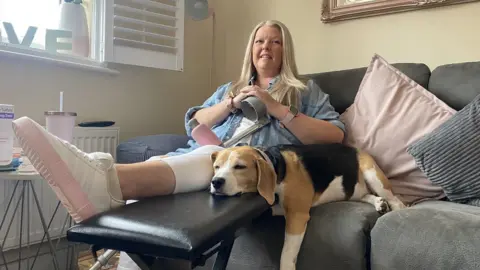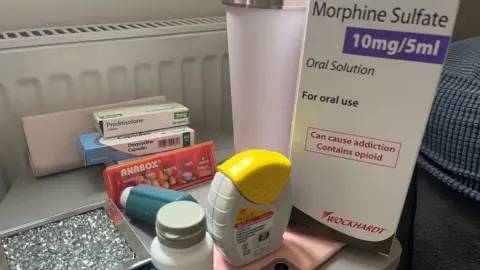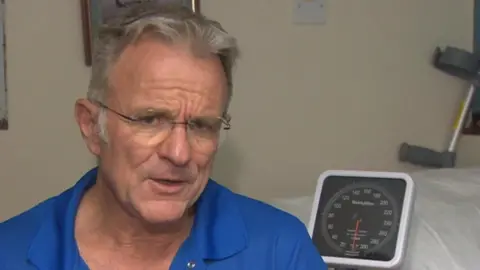Chronic pain: 'I pleaded with them, just take my leg off'
 BBC
BBCA mother-of-two has told how pain in her knee became so unbearable she pleaded with doctors to remove her leg.
Angela Hillsley, 47, who lives in Clacton, has been on morphine for four years to help manage the pain.
A BBC survey found 28% of people in the East of England are living with chronic pain.
Mrs Hillsley, who has two adult children, was diagnosed with a benign tumour in a bone in her knee four years ago.
Chronic pain is when the agony carries on for more than 12 weeks despite medication or treatment.
The BBC research found that across the UK one in four adults aged between 16 and 75 (26%) are living with chronic pain.
The pain was so much "I pleaded with them, just take my leg off," Mrs Hillsle ysaid.
Her pain has increased severely and she has had to give up her job working with children.
Before she was diagnosed she was active, even running for charity.
She is now only able to get about by using crutches and a specially adapted wheelchair.

She was told "it's something I'm going to have to carry on with because if they tried to operate on it, it would make things a lot worse."
Ms Hillsley takes 33 different tablets daily and is worried she is becoming addicted to the opioid morphine.
BBC News research found nearly a quarter of those with chronic pain were taking potentially addictive opioid painkillers, with 23% on waiting lists for pain management.
"My mental health has rapidly declined, to a point my family have to listen to me say maybe it's better if I weren't here?" said Ms Hillsley.
The effect of taking so many medications has also meant she had developed other conditions, including ischemic colitis, vitamin D and calcium deficiencies and an underactive thyroid.
"I've gone to the pain team and said look, with all this medication, they'd knock a cow out, but I've become immune to it, my body has just adjusted to having it."
Mrs Hillsley is expecting to attend a clinic where health experts will observe her for a week, in the hope of finding an alternative to prescribing her increasingly strong opioids.

Dr Mark Hainsworth, of Bildeston Health Centre in Suffolk, has become increasingly concerned by the growing number of hospital patients being advised to take strong painkillers.
He said opiates were very successful at dealing with acute pain, like a car accident, but are more problematic when dealing with longer-term conditions, as people "can habituate to the opiates, so they get used to the opiate".
"To get the same effect they will therefore require more and more, and as the level of opiate goes up in their system, that will then have a detrimental affect on things like their balance, their memory, their cognition, and that can lead to further problems in their own right," he said.
"And of course, after a period of time when their pain has resolved, we then have to get them off the opiates, which can be a very uncomfortable experience... they can suffer withdrawal like anyone else, that can be psychological or physical."
Dr Hainsworth wants to see a different approach to dealing with chronic or persistent pain, to help prevent the rise in "opiate hermits", people unable to work or exercise.
"We need to be able to address exercise, diet, way of life. And we need to also be able to understand and support the pain the patient is feeling," he said.
In a statement NHS England said: "The NHS is recruiting more clinical pharmacists and trained staff based at GP surgeries, so patients can access specialist care, including offering alternatives to medication where this is appropriate".
If you, or someone you know, have been affected by addiction, the BBC Action Line has details of organisations that may be able to help.

Find BBC News: East of England on Facebook, Instagram and Twitter. If you have a story suggestion email [email protected]
